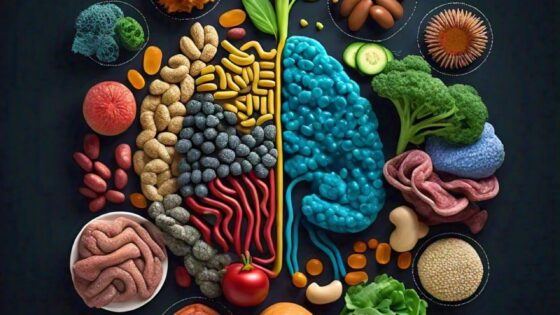Introduction
In today’s fast-paced world, making healthy food choices can often be a challenge. Despite the increasing awareness about nutrition and well-being, many people still consume bad foods that are detrimental to their health. This comprehensive guide delves into various types of foods that are bad for health, the reasons they are harmful, and healthier alternatives. Understanding these can help you make more informed decisions about your diet and lead a healthier lifestyle.
1. Sugary Foods and Beverages
The Problem with Sugar
Sugar is one of the most commonly consumed ingredients worldwide, yet it is also one of the most harmful. High sugar intake is linked to a range of health issues, including obesity, type 2 diabetes, heart disease, and dental problems.
Common Sugary Culprits
- Soda and Sugary Drinks: These beverages are loaded with sugar and offer no nutritional benefits. Regular consumption can lead to weight gain and increased risk of metabolic syndrome.
- Candy and Sweets: High in sugar and often fat, candies and sweets contribute to tooth decay and other metabolic disorders.
- Pastries and Baked Goods: These often contain high levels of sugar and unhealthy fats, leading to weight gain and increased risk of chronic diseases.
Healthier Alternatives
- Water: The best alternative to sugary drinks.
- Fresh Fruit: Satisfies sweet cravings with added fiber and nutrients.
- Homemade Baked Goods: Use natural sweeteners like honey or maple syrup in moderation.
2. Processed Foods
Understanding Processed Foods
Processed foods are those that have been altered from their natural state, often through methods such as canning, freezing, refrigeration, dehydration, and aseptic processing. Consequently, these alterations can impact the nutritional value and quality of the food. They are typically high in unhealthy fats, sodium, and sugar, and low in essential nutrients.
Common Processed Foods
- Fast Food: High in unhealthy fats, sodium, and calories, fast food is a major contributor to obesity and heart disease.
- Packaged Snacks: Chips, crackers, and similar snacks are often high in sodium and unhealthy fats.
- Processed Meats: Sausages, hot dogs, and deli meats contain preservatives and are linked to an increased risk of cancer and heart disease.
Healthier Alternatives
- Whole Foods: Opt for fruits, vegetables, and whole grains.
- Homemade Meals: Preparing meals at home allows control over ingredients.
- Fresh Meat: Choose unprocessed, lean cuts of meat.
3. Trans Fats
The Danger of Trans Fats
Manufacturers create trans fats artificially and use them in many processed foods to extend shelf life. These fats are extremely harmful and increase the risk of heart disease, stroke, and type 2 diabetes.
Foods Containing Trans Fats
- Margarine: Some margarines and butter substitutes contain trans fats.
- Baked Goods: Many commercially baked goods, like cookies and cakes, contain trans fats.
- Fried Foods: Fast food and restaurant fried foods often use oils high in trans fats.
Healthier Alternatives
- Olive Oil: A healthy fat alternative for cooking and baking.
- Butter: In moderation, butter is a better option than margarine with trans fats.
- Homemade Baked Goods: Use healthier oils and avoid hydrogenated fats.
4. Refined Carbohydrates
Why Refined Carbs are Harmful
Stripping refined carbohydrates of most nutrients and fiber leads to rapid spikes in blood sugar levels and subsequent crashes. This can increase the risk of obesity, type 2 diabetes, and heart disease.
Common Sources of Refined Carbs
- White Bread: Made from refined flour, lacking in fiber and nutrients.
- Pastries and Sweets: High in refined sugars and flour.
- Pasta: Regular pasta is made from refined wheat flour.
Healthier Alternatives
- Whole Grains: Opt for whole wheat bread, brown rice, and quinoa.
- Fruits and Vegetables: Naturally low in refined carbs and high in fiber.
- Legumes: Beans and lentils provide complex carbohydrates and fiber.
5. High-Sodium Foods
The Issue with Sodium
Excessive sodium intake is linked to high blood pressure, heart disease, and stroke. Moreover, many processed and restaurant foods are loaded with sodium to enhance flavor and preservation. High-Sodium Foods to Avoid
- Processed Meats: High in sodium and preservatives.
- Canned Soups and Vegetables: Often contain added salt.
- Fast Food: Typically very high in sodium.
Healthier Alternatives
- Fresh Foods: Naturally low in sodium.
- Herbs and Spices: Use these to flavor food instead of salt.
- Low-Sodium Options: Look for low-sodium versions of canned goods and processed foods.
6. Artificial Additives
Why Artificial Additives are Harmful
Manufacturers use artificial additives, including colors, flavors, and preservatives, to enhance the appearance, taste, and shelf life of food. Researchers have linked some of these additives to health issues such as allergies, asthma, and even cancer.
Common Additives to Watch Out For
- Artificial Sweeteners: Found in diet sodas and sugar-free products; some studies suggest they may disrupt metabolism and gut bacteria.
- Artificial Colors: Linked to hyperactivity in children and potential carcinogenic effects.
- Preservatives: Such as BHA and BHT, used to extend shelf life, have been linked to cancer in animal studies.
Healthier Alternatives
- Natural Sweeteners: Use honey, maple syrup, or stevia in moderation.
- Fresh and Whole Foods: Avoid processed foods with artificial additives.
- Natural Preservatives: Opt for foods preserved with natural methods like vinegar and salt.
7. Excessive Alcohol
The Risks of Alcohol
Excessive alcohol consumption leads to numerous health risks, including liver disease, addiction, heart disease, and an increased risk of certain cancers. However, moderate drinking may have some health benefits.
Managing Alcohol Consumption
- Moderation: Stick to recommended guidelines – up to one drink per day for women and two for men.
- Non-Alcoholic Alternatives: Opt for sparkling water, herbal teas, or non-alcoholic beverages.
- Healthy Lifestyle: Incorporate regular exercise and a balanced diet to mitigate some of the risks associated with alcohol.
8. High-Calorie, Low-Nutrient Foods
Empty Calories and Their Impact
Foods that are high in calories but low in nutrients, often referred to as “empty calories,” contribute to weight gain and malnutrition. They provide little to no vitamins, minerals, or fiber and can lead to chronic health issues.
Common Empty Calorie Foods
- Sugary Drinks: High in calories and sugar, offering no nutritional benefit.
- Candy and Sweets: Provide sugar and calories without essential nutrients.
- Fast Food: Often high in calories, fats, and sodium but low in essential nutrients.
Healthier Alternatives
- Nutrient-Dense Foods: Choose foods rich in vitamins, minerals, and fiber, such as fruits, vegetables, whole grains, and lean proteins.
- Homemade Meals: Control the ingredients and nutritional content.
- Balanced Snacks: Opt for nuts, seeds, and fresh fruit instead of candy and sweets.
Conclusion
Maintaining a healthy diet requires awareness and conscious choices about the foods you consume.To improve your overall health, start by avoiding or limiting the intake of sugary foods and beverages, processed foods, trans fats, refined carbohydrates, high-sodium foods, artificial additives, excessive alcohol, and high-calorie, low-nutrient foods. Instead, opt for whole, fresh, and minimally processed foods to ensure your diet is rich in essential nutrients. Consequently, this will support a healthy and balanced lifestyle. Ultimately, by making these changes, you can significantly enhance your well-being.
Remember, the key to a healthy diet is moderation and variety.It’s not about eliminating certain foods; rather, it’s about making informed choices and, consequently, finding a balance that works for you.
Learn about hypertension: https://www.who.int/news-room/fact-sheets/detail/hypertension




Leave a Reply